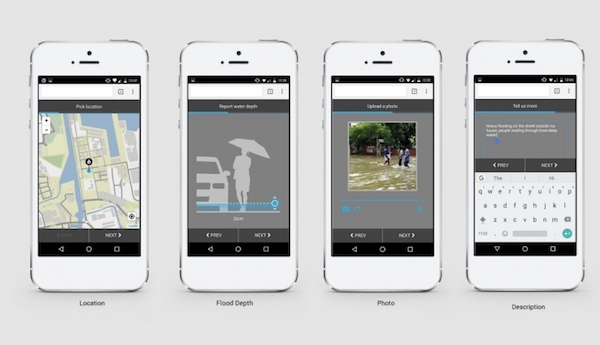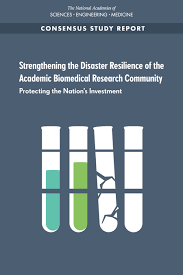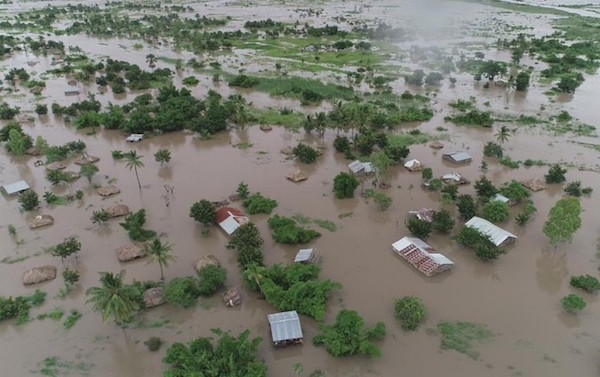 As Hurricane Irma bears down on the U.S., the MIT Urban Risk Lab has launched a free, open-source platform that will help residents and government officials track flooding in Broward County, Florida. The platform, RiskMap.us, is being piloted to enable both residents and emergency managers to obtain better information on flooding conditions in near-real time...
As Hurricane Irma bears down on the U.S., the MIT Urban Risk Lab has launched a free, open-source platform that will help residents and government officials track flooding in Broward County, Florida. The platform, RiskMap.us, is being piloted to enable both residents and emergency managers to obtain better information on flooding conditions in near-real time...
disaster resilience
See the following -
Academic Biomedical Research Community Should Take Action to Build Resilience to Disasters
 The academic biomedical research community should improve its ability to mitigate and recover from the impacts of disasters, says a new report from the National Academies of Sciences, Engineering, and Medicine. The consequences of recent disasters, from hurricanes to cyberattacks, have shown that the investments of the U.S. federal government and other research sponsors -- which total about $27 billion annually -- are not uniformly secure. The report recommends 10 steps that academic research institutions, researchers, and research sponsors should take to bolster the resilience of academic biomedical research.
The academic biomedical research community should improve its ability to mitigate and recover from the impacts of disasters, says a new report from the National Academies of Sciences, Engineering, and Medicine. The consequences of recent disasters, from hurricanes to cyberattacks, have shown that the investments of the U.S. federal government and other research sponsors -- which total about $27 billion annually -- are not uniformly secure. The report recommends 10 steps that academic research institutions, researchers, and research sponsors should take to bolster the resilience of academic biomedical research.
- Login to post comments
COVID-19 Will Be The Ultimate Stress Test For Electronic Health Record Systems
 As the novel coronavirus that causes Covid-19 continues its march around the world and through the United States, it is spawning another kind of infection: Covid-19 cyber threats aimed at individuals and health systems. We aren't crying wolf here. Disaster planning experts know all too well that preexisting weaknesses become worse during crises. The WannaCry cyber attack that devastated the United Kingdom's National Health Service is a good example. Outdated infrastructure containing components with long-understood vulnerabilities are a hacker's paradise...The undeniable fact that electronic health record systems are designed to track and bill procedures rather than provide optimal patient care is likely to be on full display as the health system becomes increasingly saturated with Covid-19 patients.
As the novel coronavirus that causes Covid-19 continues its march around the world and through the United States, it is spawning another kind of infection: Covid-19 cyber threats aimed at individuals and health systems. We aren't crying wolf here. Disaster planning experts know all too well that preexisting weaknesses become worse during crises. The WannaCry cyber attack that devastated the United Kingdom's National Health Service is a good example. Outdated infrastructure containing components with long-understood vulnerabilities are a hacker's paradise...The undeniable fact that electronic health record systems are designed to track and bill procedures rather than provide optimal patient care is likely to be on full display as the health system becomes increasingly saturated with Covid-19 patients.
- Login to post comments
How Can Information and Communications Tech Help in Disaster Preparedness and Response?
 n the immediate aftermath of disasters, timely and effective information is critical for the decision-making process. Information and Communication Technologies (ICTs) play a significant role in mitigation, preparedness, response, and rehabilitation by facilitating the flow of vital information in a timely manner. To deliver and deploy telecommunications / information and communication resources (transportable, easy to deploy and reliable systems that are non-exclusive) in a timely manner in the event of disasters, the ITU has designed the ITU Framework for Cooperation in Emergencies (IFCE). Innovative technologies such as robotics, drone technology, GIS, and emerging technologies like artificial intelligence (AI), the Internet of Things (IoT), cloud computing and Big Data are transforming the complex process of disaster management.
n the immediate aftermath of disasters, timely and effective information is critical for the decision-making process. Information and Communication Technologies (ICTs) play a significant role in mitigation, preparedness, response, and rehabilitation by facilitating the flow of vital information in a timely manner. To deliver and deploy telecommunications / information and communication resources (transportable, easy to deploy and reliable systems that are non-exclusive) in a timely manner in the event of disasters, the ITU has designed the ITU Framework for Cooperation in Emergencies (IFCE). Innovative technologies such as robotics, drone technology, GIS, and emerging technologies like artificial intelligence (AI), the Internet of Things (IoT), cloud computing and Big Data are transforming the complex process of disaster management.
- Login to post comments
MIT Map Offers Real-Time, Crowd-Sourced Flood Reporting during Hurricane Irma
- Login to post comments